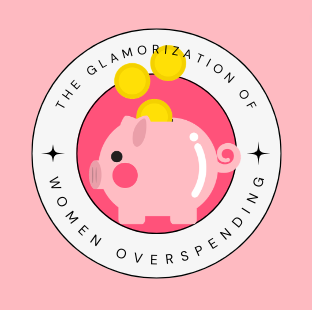Today’s modern and materialistic culture has forced a degrading and harmful ideology into women’s heads: that financial irresponsibility is simply part of womanhood.
Stemming from social media, the public, primarily women, has now adopted a trait of spending more than they have. Even more concerning, society condones this, making it out to be normal.
On many social media platforms, content creators show their new purchases and laugh off the fact that they spent their last dollar to buy a Starbucks drink and lip gloss with the excuse of, “I’m just a teenage girl.” While splurging on fun things is not naturally a bad thing, the habit society has gotten into has made it into one.
The comedic turn on this situation makes debt seem unserious, creating a false reality. This is popularly referred to as “girl math” and although taken lightly, it is actually very harmful to this generation of young women.
The rise of influencers is both the best and worst thing to happen to social media. Social media influencers have a great deal of ascendancy over their followers; this can be used to create a constructive space, influencing followers to do good things in the world.
It can also, in turn, achieve the opposite effect.
“I always see videos of girls buying new products on shopping hauls on social media. I love shopping so when I see other people buying things, it makes me want to shop too,” senior Maira Dar said.
Trendy products are the downfall of many teenage girls; when everyone else has them, they want them too. Influencing platforms target women who are vulnerable to this and make them think they absolutely need the newest, trendiest things, even when they don’t.
“Social capital,” PV business teacher Janene Murphy remarked. “You want to build that whole thing. Social media has trained people to want to post things for likes. You’re essentially paying money for likes and acknowledgment.”
An ideology like this creates a very materialistic society. Many women participate in what is called retail therapy, which involves making extreme purchases in times of hardship or stress. Society has made women out to be bound to this; that, rather than handling hard things head on, the feminine thing to do is to spend money instead.
This is not only destructive, but also highly degrading.
No one tells a man to spoil himself every time he has a bad day at work. Men are seen as financially responsible figures in society, and while women generally score better in many financial fields, they are taken less seriously in society as a whole due to recent spending habits.
Overspending is not part of being a woman and society convincing women that it is will have negative effects in the near future if a perspective change does not occur.
In 2023, 44% of young women stated that their credit card debt is delaying them from making important purchases such as homes and cars. The mindset that convinces women to make irresponsible purchases is only making this debt worse, but is of less concern to the public.
“I love to spend money and I’m really easily influenced so anytime I see a product on social media that I want, I need to buy it. I work hard so I think I deserve to buy stuff,” Dar voiced.
Due to the boom of social media in the last decade, this was not as much of an issue in previous generations.
“When I was in high school, what you wore was a big deal. You always wanted to wear nice clothes, and that sort of thing. But, obviously it’s elevated now. Now you’ve got a megaphone on it because of social media,” Murphy stated.
Women have made so many financial advancements in history, and with advancements come financial freedom; women are not confined to the standards society has made for them. While the current state isn’t promising, this strong generation of young women battling toxic social media pressure can find the light at the end of the tunnel.









